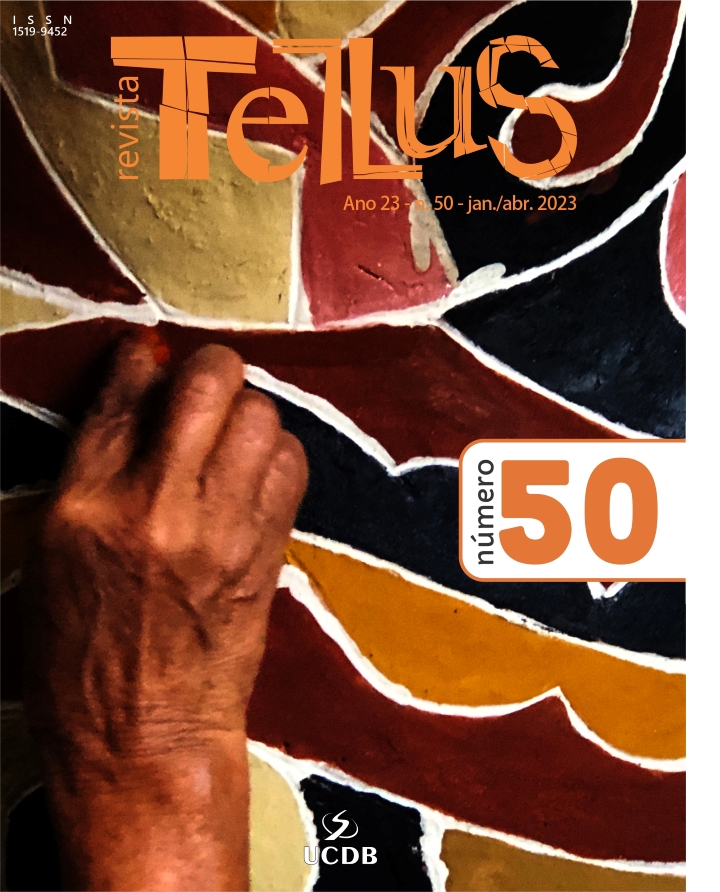Continuing teacher education for a’uwẽ uptabi and non-indigenous teachers: a proposal in search of training in interculturality
DOI:
https://doi.org/10.20435/tellus.v23i50.861Keywords:
A’uwẽ uptabi Teacher Education and non-indigenous teachers, interculturality, school education, indigenous educationAbstract
The text portrays activities carried out during an extension course in Continuing Teacher Education for A’uwẽ (Xavante) Teachers from the Pimentel Barbosa Indigenous Land. It aims at giving visibility and making known both the research and extension work that this group of professors have already performed with this group of A’uwẽ uptabi teachers, and the recent proposal of continuing education from 2022 to 2024. We can also add another objective in this continuing education: training for indigenous and non-indigenous teachers aiming at intercultural education. The course – pedagogical workshop for A’uwẽ uptabi teachers: the search for possible interculturality – happened at the Pimentel Barbosa Municipal Indigenous School in Pimentel Barbosa and is part of the research and extension course developed with the communities of this Indigenous Land. The methodology used follows phenomenological orientation inspired by Merleau-Ponty. It is open, organized with informal talks, expository and dialogue classes, bibliographic research, meetings with the communities involved, observations, and open interviews with teachers, students, leadership and tribe chiefs. In this text, besides tackling issues addressed in the 30-hour workshop, the new proposal of continuing education for A’uwẽ and non-indigenous teachers who participate in these two courses is presented: extension and research, was included. Thus, considering this workshop, I conclude that the difficulties are not only felt by the indigenous people, but also by us as educators, and this new proposal is an outreach in terms of training teachers for the indigenous school educational field – enlarged teacher training with a focus on the dimension of differences.
References
BLONDEAU, Nicole; BOY, Véronique; POTOLIA, Anthipp. Escola sem muros: uma escola da reliance (Org.). Grande: EDUFCG, 2021.
BRASIL. Lei n. 10.172, de 9 de janeiro de 2001. Aprova o Plano Nacional de Educação e dá outras providências. Brasília, DF: Presidência da República; Casa Civil; Subchefia para Assuntos Jurídicos, 2001.
BRASIL. Resolução CEB n. 3, de 10 de novembro de 1999. Fixa Diretrizes Nacionais para o funcionamento das escolas indígenas e dá outras providências. Brasília, DF: CEB; CNE, 1999a.
BRASIL. CONSELHO NACIONAL DE EDUCAÇÃO [CNE]. Parecer n. 14/99. Diretrizes curriculares nacionais da educação escolar indígena. Brasília, DF: CNE, 1999b.
BRASIL. Lei n. 9.394, de 20 de dezembro de 1996. Estabelece as diretrizes e bases da educação nacional. Brasília, DF: Presidência da República; Casa Civil; Subchefia para Assuntos Jurídicos, 1996.
BRASIL. Constituição da República Federativa do Brasil. Brasília, DF: Presidência da República; Casa Civil; Subchefia para Assuntos Jurídicos, 1988.
BUSTOS, Jesús Antona. Los derechos humanos de los pueblos indígenas: el Az Mapu y el caso mapuche. Temuco: Edisiones Universidad Católica de Temuco, 2014.
CAPALBO, Creusa. Fenomenologia e Ciências humanas. Aparecida: Idéias & Letras, 2008.
FREIRE, Paulo. Pedagogia do Oprimido. 17. ed. Rio de Janeiro: Paz e Terra, 2000.
FREIRE, Paulo. Pedagogia da autonomia: saberes necessários à prática educativa. São Paulo: Paz e Terra, 1996.
MELIÁ, Bartomeu. Educação Indígena e Alfabetização. São Paulo: Edições Loyola, 1979.
MERLEAU-PONTY, Maurice. Fenomenologia da percepção. 3. ed. São Paulo: Martins Fontes, 2006.
MERLEAU-PONTY, Maurice. Sígnos. São Paulo: Martins Fontes, 1991.
MINISTÉRIO DA EDUCAÇÃO E DO DESPORTO [MEC]. SECRETARIA DE EDUCAÇÃO FUNDAMENTAL [SEF]. Referencial curricular nacional para as escolas indígenas. Brasília: MEC/SEF, 1998.
MORIN, Edgar. O método 2: a vida da vida. 5. ed. Porto Alegre: Editora Sulina, 2015.
PASSOS, Luiz Augusto. Currículo, tempo e cultura. 2003. Tese (Doutorado em Educação) - Pontifícia Universidade Católica (PUC), São Paulo, 2003.
REZENDE, Maria Aparecida. Educação Escolar Indígena interligada à educação indígena: um problema a ser resolvido. In: BLONDEAU, Nicole; BOY, Véronique; POTOLIA, Anthipp. Escola sem muros: uma escola da reliance (Org.). Grande: EDUFCG, 2021. p. 191-96.
SALAS, Ricardo. Ética intercultural: (re) leituras do pensamento Latino-Americano. São Leopoldo: Nova Harmonia, 2010.
STRECK, Danilo; REDIN, Euclides; ZITKOSKI, Jaime. Dicionário Paulo Freire. 2. ed. Belo Horizonte: Editora Autêntica, 2008.
Downloads
Published
How to Cite
Issue
Section
License
Copyright (c) 2022 Maria Aparecida Rezende

This work is licensed under a Creative Commons Attribution 4.0 International License.
Todos os artigos publicados na Revista Tellus estão disponíveis online e para livre acesso dos leitores, tem licença Creative Commons, de atribuição, uso não comercial e compartilhamento pela mesma. Direitos Autorais para artigos publicados nesta revista são do autor, com direitos de primeira publicação para a revista. Em virtude de aparecerem nesta revista de acesso público, os artigos são de uso gratuito, com atribuições próprias, em aplicações educacionais e não-comerciais.


